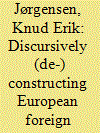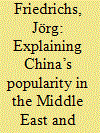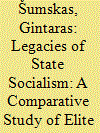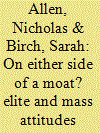| Srl | Item |
| 1 |
ID:
142066


|
|
|
|
|
| Summary/Abstract |
This article is about European foreign policy, specifically an examination of ways in which discourse analysis and foreign policy analysis can be brought together. The first aim of this article is to explicate the explanandum in some detail. Before we know what we are looking for, it gives limited meaning to consider procedures for methodological procedures. Once the explanandum has been identified, the article examines theoretical approaches and critically discusses their promises and limitations. Priority is given to the option of applying constructivist discursive theories that might (or might not) have been developed with a view to analysing foreign policy, including European foreign policy. In doing so, the article aims at bridging several sometimes very different fields of study: discourse theory, which is sometimes utterly unaware of or uninterested in foreign affairs; and foreign policy analysis, which is frequently descriptive in orientation and at times characterized by less-than-benign neglect of discourse theory.
|
|
|
|
|
|
|
|
|
|
|
|
|
|
|
|
| 2 |
ID:
167576


|
|
|
|
|
| Summary/Abstract |
China enjoys considerable popularity in the Middle East and Africa, not only among elites but also at street level. This article draws on international relations theories to explain this general pattern, as well as intra- and interregional variation. Every approach has something to contribute, but international political economy more so than realism. Constructivist theories are particularly useful in explaining China’s popularity in the Middle East and Africa.
|
|
|
|
|
|
|
|
|
|
|
|
|
|
|
|
| 3 |
ID:
166788


|
|
|
|
|
| Summary/Abstract |
The elites of Western Europe prefer social security for all citizens as the major aim of the EU, while the preference of Central and Eastern European elites is for a more globally competitive European economy. This disparity between elite preferences may be accounted for by the distinct electorates and elites’ responsive strategic calculations, or by the process of socialisation Central and Eastern European elites undergo during exposure to the EU. This article argues that the predominant reason for the difference in elite attitudes towards economic competition is the lasting effect of state socialism in Central and Eastern European countries.
|
|
|
|
|
|
|
|
|
|
|
|
|
|
|
|
| 4 |
ID:
111501


|
|
|
|
|
| Publication |
2012.
|
| Summary/Abstract |
This article develops a cognitive institutionalist account of mass and elite evaluations of political ethics, which is tested on a new dataset from the United Kingdom. The analysis explores the extent of contemporary disagreement among British political elites and those they represent by comparing responses to questions asked in a representative survey of the public with similar questions asked of incumbent MPs and parliamentary candidates. There are systematic differences between members of the public, candidates and MPs at both aggregate and individual levels - differences which can be accounted for with reference to the framing effects of Parliament as an institution. Candidates for parliamentary office display significantly more tolerance of ethically dubious behaviour than other members of the public. Within the elite category, elected MPs exhibit more permissive ethical standards than those candidates who are unsuccessful.
|
|
|
|
|
|
|
|
|
|
|
|
|
|
|
|